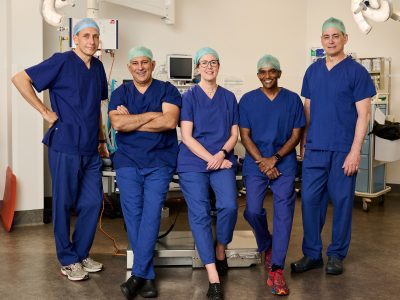‘Labiaplasty’ is a form of cosmetic genital surgery involving reshaping of the labia. Women who choose this surgery do so because they want to change the appearance of their genitals or for reasons of discomfort.
The decision to have labiaplasty surgery is a personal choice and should be made only to please yourself.
Please note patients must be aged 17 years or older to book an appointment to discuss this procedure, and aged 18 years or older to undergo labiaplasty surgery.
Labiaplasty in Perth
As a woman ages and particularly following childbirth, the labia minora (inner lips) can naturally change in appearance. Perth labiaplasty surgery aims to change the size and shape of the inner labia or the inner lips of the vulva.
In addition, some patients may express a desire for alterations to their mons pubis (the mound of flesh on top of a woman’s pubic bone covered by pubic hair). This procedure can be performed together with a labiaplasty or as part of a body contouring process.
It’s important to note our Specialist Plastic Surgeons do not offer surgical procedures for the labia majora (the outer lips) or the clitoral hood. They also do not perform hymenoplasty or vaginoplasty surgery, or “vaginal rejuvenation” procedures.
Book a Consultation
To find out if labiaplasty in Perth is right for you, the first step is to book an appointment with one of our Specialist Plastic Surgeons.
At Assure Cosmetic Centre, you’re in the care of a highly skilled medical team. Through your journey with us you will feel informed and comfortable and able to make the decision that is best for you.
Frequently Asked Questions
Labiaplasty
Labiaplasty surgery may be of benefit to you if you feel uncomfortable with the appearance of your labia or feel discomfort when wearing certain clothing or undertaking certain activities. It can improve your appearance by reducing the size of, and reshaping, the labia. Labiaplasty will not make the vagina smaller or tighter. Your Specialist Plastic Surgeon at Assure Cosmetic Centre is the best person to determine if your expectations are achievable.
The surgeon removes the unwanted labial tissue and then resizes and reshapes the labia minora to ensure they no longer extend beyond the labia majora. Dissolving sutures are used to minimise discomfort during removal, and due to the well-developed nerve and blood supplies in the area, the labia are generally quick to heal.
In Perth, labiaplasty is performed in an accredited hospital under local or general anaesthetic. You can expect to be discharged that same day or after a short hospital stay. This will depend on your general health, the extent of the procedure, and your surgeon’s advice.
You will need to attend a post-operative consultation approximately 5-7 days after labiaplasty surgery and again 7-14 days after surgery with subsequent post-op visits if required.
All plastic, cosmetic and reconstructive surgical procedures come with risks and potential complications. To ensure successful surgery, it is crucial to understand and minimise these risks. Whilst all measures are taken to mitigate risks, some risks are unavoidable.
All information on this page is general in nature – your Specialist Plastic Surgeon will discuss the specific risks and complications pertinent to your individual surgical procedure during your consultation. General risks for surgery are listed here.
Specific risks related to labiaplasty surgery include, but are not limited to:
- Asymmetry in the appearance of the labia following the surgery.
- Overcorrection or undercorrection of the labia.
- Requirement for further surgery to address complications.
While your surgeon will take great care to minimise their visibility, it’s important to understand that scars are an unavoidable outcome of any surgical procedure. Following a labiaplasty, the scars are generally insignificant and hidden, so are easily concealed. If you have a history of keloid or hypertrophic scarring, it’s essential to inform your surgeon about this tendency before the procedure.
Although no major complications are expected with labiaplasty, you may have some bruising and swelling after surgery. Your Specialist Plastic Surgeon will discuss what you can expect from this procedure. It is important to carefully follow your plastic surgeon’s advice to reduce the risk of complications.
Patients are advised to refrain from engaging in physical activity immediately after the procedure or during your recovery period. It is essential to minimise walking to avoid irritation in the treated area. Many patients return to work after 1 week and some even sooner however, we advise waiting approximately 2 weeks before resuming your regular exercise routine.
It’s essential to highlight that each patient’s recovery process requires sufficient time, support, and proper postoperative care. Healing abilities and pain tolerance may vary among individuals, resulting in differences in recovery duration and the ability to engage in various activities.
An initial consultation with your Specialist Plastic Surgeon will cost approximately $300-$360, which is payable in full at the time of booking your consultation. Your consultation will take approximately 30-60 minutes. If a Medicare item applies to your potential procedure then you will be entitled to a rebate from Medicare of approximately $80, providing you have a written referral from your GP or specialist. GP referrals are valid for 12 months and specialist referrals for 3 months.
Your Specialist Plastic Surgeon will provide an indication of the likely costs, such as your surgeon’s fee, anaesthetist’s fees and hospital and theatre fees. Your surgeon’s fee includes all post-operative care and nurse dressings. Pricing will vary from case to case, but an indicative range of your surgeon’s fee is $3,500 to $5,000 excluding GST. Anaesthetist, hospital and theatre fees are additional.
There are Medicare and private health insurance rebates available for certain labiaplasty procedures in Perth. Your surgeon can provide you with more information, but you would then need to talk to your private health insurer to determine exactly how much cover they will provide and confirm what your final out-of-pocket costs will be.


